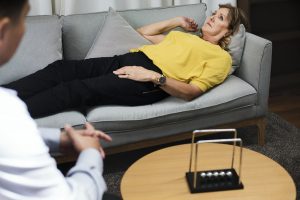Common depression treatments involves antidepressants, but depression treatment without pills is an option for those where pills don’t work.
Researchers have investigated the effectiveness of antidepressants versus placebos. This showed that antidepressants relieve symptoms of depression in 40 to 60%. In contrast, a placebo pill will help depression in 20 to 40%. It does not matter what chemical structure the antidepressant has, there is never a 100% effect. When it comes to relapse of depression within 1 to 2 year of maintenance antidepressant therapy, the antidepressant fares somewhat better. Only 23% of patients on antidepressant maintenance therapy had a relapse of depression while on the medicine. In contrast, patients who received a placebo pill had a relapse of depression in 50% of cases.
Repetitive Transcranial Magnetic Stimulation
There are patients for whom nothing worked. They had received various antidepressants, but there was no response. This is called “treatment-resistant depression”. Surprisingly there is an alternative, a depression treatment without pills, namely repetitive transcranial magnetic stimulation. You need the proper machine to do this with experts who are running it. This is the case at the Centre for Addiction and Mental Health (CAMH) in Toronto, Ont.
Case history regarding depression treatment without pills
Tom Churchill, a 67-year old retired executive from Toronto had treatment-resistant depression all his life. He heard of repetitive transcranial magnetic stimulation and received treatment by the Toronto team. “It was a 20-day round of treatments, and on the ninth day I walked out, and the world had transformed,” said Churchill. This treatment modality has been in clinical use since 1996. But at CAMH in Toronto they are continually learning how to increase the responsiveness to this treatment. At the present time they have a treatment success rate of 30%. Dr. Daniel Blumberger, the medical director of the repetitive transcranial magnetic stimulation team said: “We’re studying new ways to deliver the treatment and how to improve it. “ He added that he hopes to achieve about 60% treatment successes or beyond with further modifications.
Other depression treatment without pills
There is the older depression treatment without pills, called electroconvulsive therapy (ECT). You may remember this from the movie “One Flew Over the Cuckoo’s Nest”. However, this is much harsher and has problems of memory loss. Repetitive transcranial magnetic stimulation is much more gentle and has none of these side effects. Apart from these methods cognitive/behavioral therapy has been as effective as antidepressant therapy in treating depression.
In the meantime Tom Churchill is all smiles that he has finally received a cure of his more than 50-year old endogenous depression without pills.
Conclusion
Treating depression is not always as easy as taking a prescription pad and writing a prescription for one of the antidepressants. 50 to 60% of patients may not respond to this treatment modality. But repetitive transcranial magnetic stimulation can improve that treatment success by another 30%, so that between pills and depression treatment without pills an impressive treatment success rate of 80 to 90% is possible.







